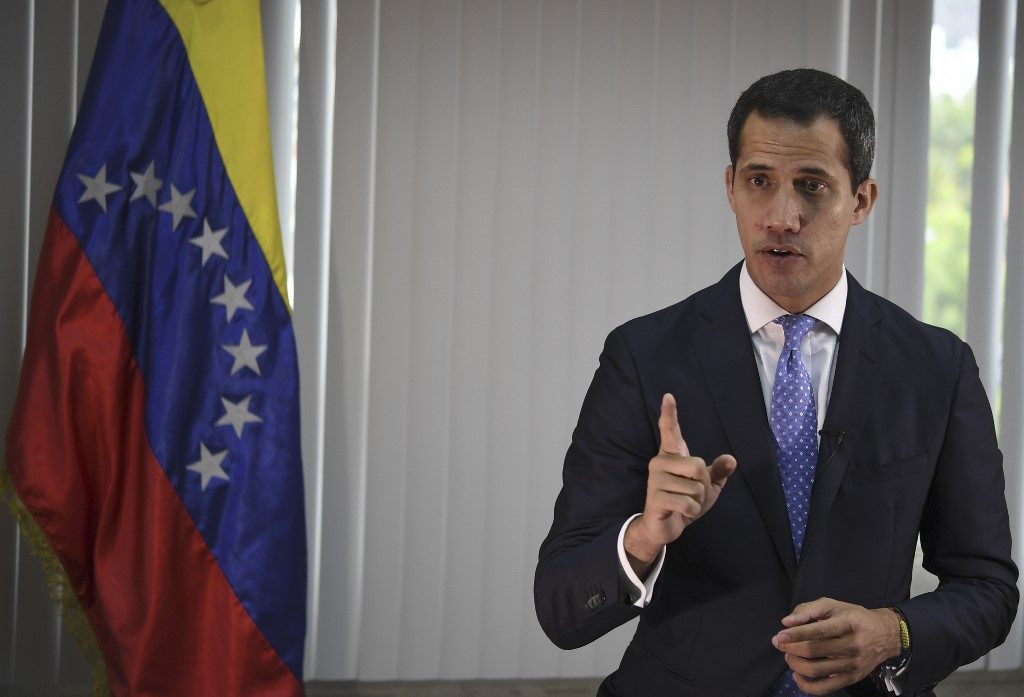SUMMARY
This is AI generated summarization, which may have errors. For context, always refer to the full article.

CARACAS, Venezuela – Opposition leader Juan Guaido is confident he will be reelected as Venezuela’s parliament speaker on Sunday, January 5, even though he says opponents offered bribes to lawmakers to vote against him.
Guaido, 36, issued a statement on Friday addressed to the “international community” announcing that his leadership “will be ratified.”
Sunday’s election comes after a tumultuous year in which Guaido declared himself acting president and at times seemed close to toppling socialist President Nicolas Maduro.
While the first half of 2019 was full of drama, tension, an abortive military uprising, arbitrary detentions, US sanctions and a political tug-of-war, by the end of the year Guaido’s push seemed to have run out of steam.
Maduro appears firmly entrenched in the presidential palace, thanks primarily to the support of the armed forces, and Guaido is merely attempting to hold onto his primary role, as speaker of the National Assembly.
He needs a simple majority of 84 in the 167-seat assembly, which should be a foregone conclusion because opposition lawmakers won 112 seats in legislative elections in 2015.
However, since then the opposition has been fractured and around 30 lawmakers have been forced into exile or to seek refuge in foreign diplomatic missions.
Guaido’s wider popularity has also nosedived from a high of 63 percent to just 39 percent in December, according to the pollster Datanalisis.
And then there’s been the accusations of bribery. Maduro has already let it be known he expects to “regain the National Assembly” later this year in parliamentary elections.
Technological help
Despite what he considers an attempt by Maduro’s ruling party to “dismember the National Assembly and look for a conflict,” Datanalisis director Luis Vicente Leon says Guaido should be successfully reelected.
Yet although the 36-year-old opposition leader said previously “we have more votes than we need,” to do so has required the help of technology.
On December 17, parliament approved a reform allowing for the “virtual participation” of absent lawmakers.
Deputy Melva Paredes said in a television interview that “means that there aren’t enough votes” amongst those physically present to reelect Guaido.
But Paredes is from the Cambiemos party, an opposition group that has distanced itself from Guaido and opted for dialogue with Maduro instead.
Reelection would be an important step for Guaido to continue his power struggle with Maduro after declaring himself acting president on January 23, 2019 – a move acknowledged by more than 50 countries, including the United States.
He claimed the right to do so after parliament declared Maduro’s 2018 reelection fraudulent, and insisted the constitution authorized his ascension to the presidency.
Even if Guaido is reelected National Assembly speaker, not much will change on Venezuela’s political landscape, according to Peter Hakim, president emeritus at the Inter-American Dialogue think tank.
“I would guess Maduro keeps hold of the government with the support of the military, while Guaido heads an opposition that remains divided on issues and strategy,” Hakim told Agence France-Presse.
‘Need for strategy’
Although backed by Washington – which hit senior regime figures with sanctions – Guaido’s momentum has been stifled by Maduro, who can count on support from China, Russia and Cuba.
Despite an economic crisis that has led to shortages of basic necessities such as food and medicines and sky-high inflation the IMF predicted would reach 200,000 percent for 2019, Maduro remains steadfast.
Guaido is determined to end Maduro’s “usurpation” before setting up a transitional government and free and transparent presidential elections.
That is highly improbable but there will be legislative elections this year, in which Maduro will try to take back control of parliament.
To avoid such a scenario, Guaido and his allies “need to formulate a clear and unified strategy,” according to David Smilde, professor of sociology and Latin-American studies at Tulane University in the United States. – Rappler.com
Add a comment
How does this make you feel?
There are no comments yet. Add your comment to start the conversation.